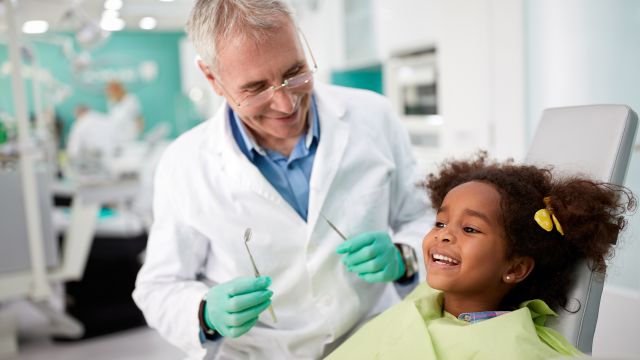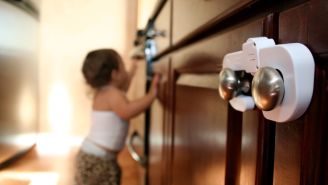Updated on May 5, 2022.
Your child’s first smile, their first tooth, the first time baby happily noshes away on their morning oatmeal. These are milestones that many parents look forward to with anxious anticipation.
But what about that first visit to the dentist? How old should a child be before that important rite of passage arrives?
Deborah Studen-Pavlovich, DMD, is chair of the Department of Pediatric Dentistry at the University of Pittsburgh School of Dental Medicine. We checked in with her for the answer to this and other common questions about children's oral health.
At what age should a child have their first dental visit?
As soon as the first tooth emerges—and no later than their first birthday—it’s time to find a dentist, according to the American Academy of Pediatric Dentistry (AAPD). This is also good time to have a conversation about dental health, nutrition, and safety. Getting the baby to the dentist early can encourage good habits, and get the child used to having someone examine their gums and teeth.
That may seem premature, but there are a couple of good reasons to start early. For one thing, that early visit makes it easier for the dentist to focus on cavity prevention.
"If we see a child at nine months who's already drinking tons of fruit juice, we can stress to parents the importance of nipping that habit in the bud before the child develops cavities from the juice," Studen Pavlovich says.
"Also, most accidents that children have occur between the ages of two and three-and-a-half years old, and oftentimes they fall and traumatize a tooth,” she adds. “So you want to have already established a dental home by this point, so you're not calling around trying to get a dentist you've never met to see you at the spur of moment."
After that initial visit how often should children visit the dentist?
"We recommend that children see their dentist every six months, just like their parents do," says Studen-Pavlovich.
Do I need to find a pediatric dentist?
Not necessarily. Depending on where you live, you might not have a pediatric dentist nearby. Instead, look for a general dentist who is comfortable treating very young children.
"When you call to make that first appointment, you can ask if the office is child-friendly and has things like stickers and child-size toothbrushes," she says.
Aren't cavities in baby teeth ‘no big deal,’ since they're going to fall out anyway?
Cavities in baby teeth are, in fact, a big deal because you can't get rid of the bacteria that's introduced in the child's mouth by brushing, Studen-Pavlovich explains. "If a child has higher levels of bacteria in their mouth when their permanent teeth erupt, they are at a higher risk of developing more cavities."
What can I do to make sure my child's first dental visit goes well?
The most important thing is to watch your own attitude. "If the parent is anxious, or tells the child, 'Don't be scared,' or bribes the child with an expensive toy, then the child will think, 'Well, maybe I should be worried.'" It's much better to remain calm and matter of fact when you're talking to your child about visiting the dentist.
What should I do if my child is afraid to go to the dentist?
An ideal first step is to schedule an introductory visit that won't involve an exam or any procedures. "A good dentist will first try to adapt your child to the environment, by showing the child the various instruments, such as the suction machine," Studen-Pavlovich says. If your child is extremely anxious at that first exam, you might ask if you can have them sit on your lap while the dentist does the exam.
Finding the right dentist for your child, and having a positive experience from the beginning, can set the tone for good oral health throughout their lifetime.







